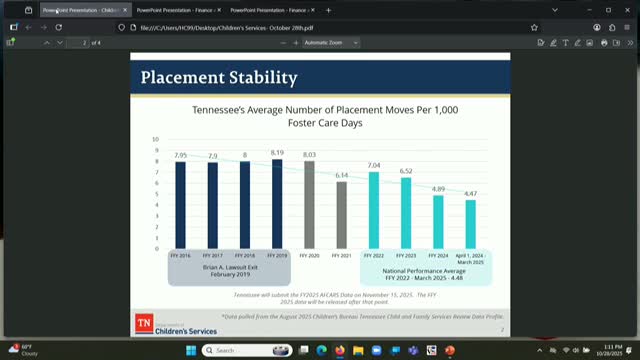DCS says placements and staff metrics improved but committee seeks caseload and mortality details
Get AI-powered insights, summaries, and transcripts
Subscribe
Summary
The Department of Children's Services told the committee it has reduced placement moves and lowered staff turnover after salary increases, is building short‑term trauma‑informed homes and expanding safe baby courts; lawmakers pressed for facility counts, caseload data and answers about child deaths and office placements.
The Tennessee Department of Children's Services (DCS) presented metrics and plans to the Finance, Ways and Means Committee on Oct. 28, saying investments in staff pay, placement capacity and new short‑term assessment homes have reduced moves for children in custody and improved stability.
Opening and main point: Commissioner Margie Quinn told members that since 2022 the agency has reduced placement moves from a cited 7.87 moves per 1,000 custody days to 4.47, “just below the national average,” and said recent investments had cut turnover and vacancies after raising starting case‑manager pay.
“By implementing strategic initiatives and wise investments, we transformed a once challenged agency into a thriving organization,” Quinn said, noting a fully funded real‑estate plan to build trauma‑informed short‑term assessment homes and that six new treatment‑style spaces are expected to be shovel‑ready by the end of the calendar year with the Jonesboro home breaking ground in 2026.
Staffing, pay and caseloads: Quinn told the committee DCS raised starting case manager pay to $50,400 and that the position flexes to $54,000 after one year. She said privatized case managers under contract are capped at 20 cases under contract rules and that child‑safety case averages remain above the agency target in some regions, with Davidson County singled out as above the case‑cap.
Safe Baby Courts and family supports: Quinn said Tennessee now has 22 safe baby court sites fully implemented or in active implementation, with two starting and eight more to complete implementation by June 2026. “Safe Baby Courts families achieve permanency faster than traditional dependency and neglect cases,” she said, adding the program has shown a lower rate of repeat maltreatment in the sites operating so far.
Children in offices and placement constraints: Committee members pressed DCS about occasional use of agency offices to temporarily house children with very high acuity or pre‑adjudicated delinquency charges when no suitable placement is immediately available. Quinn said the wholesale practice of using offices ended in March 2022 but that “there are occasions” when a highly acute or pre‑adjudicated juvenile cannot be commingled with other children and must be kept in an office while staff pursue placement. She said those children receive daily showers, education and behavioral‑health supports while in office custody and that the department is prioritizing new residential capacity to reduce that practice.
Mortality and reporting: Members asked for numbers on child deaths and near‑deaths reported to legislators. Quinn said DCS had investigated 168 death and near‑death notifications this year but clarified that most notifications reflect recent family investigations and not children currently in state custody; she said the number of children in agency custody who died in recent years was much smaller and that staff would provide precise figures to the committee.
Follow‑up requests: Lawmakers asked DCS to provide point‑in‑time caseload spreadsheets by program and region, a facility and program‑seat inventory (the commissioner said she would supply counts of educational and program seats), and an update on how privately contracted case managers are being used to lower foster‑care caseloads. Quinn said the department would provide requested data.
Ending: DCS closed with a pledge to deliver caseload and placement data and with an explanation that new short‑term assessment homes and safe baby court expansions are central to the agency’s operating plan for the coming year.
